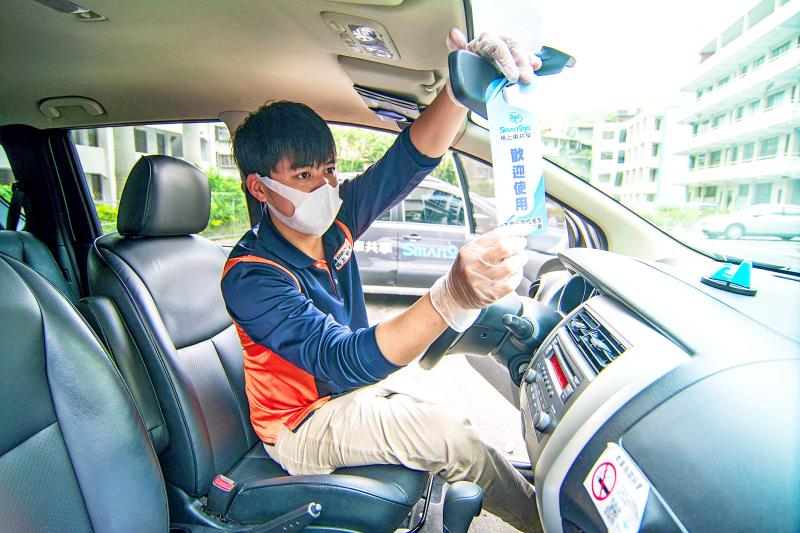The nation’s car rental industry has experienced a steep drop in business as people cancel travel plans and stay at home following a surge in local COVID-19 infections last month.
The slump in business is particularly damaging for some car rental firms and might push them into bankruptcy, the Chinese-language Liberty Times (the sister newspaper of the Taipei Times) reported yesterday, citing the Taipei Passenger Car Rental Association.
The association has called on the government to suspend vehicle fuel tax and vehicle license tax this year to help car rental companies overcome the difficulties, the newspaper reported.

Photo courtesy of Carplus Auto Leasing Co
The government last year halved the vehicle fuel and license taxes for car rental companies as part of its COVID-19 relief measures, the association said.
However, despite the situation this year being more severe than last year, the government’s latest “Stimulus 4.0” COVID-19 relief package contains no measures for the industry, leaving companies in a more miserable state, the association added.
Carplus Auto Leasing Corp (格上租車), a unit of Yulon Group (裕隆集團), has seen revenue from its short-term car rental and chauffeur service drop by nearly 70 percent, the Liberty Times reported.
The company’s rental business has been in the red since May 15, when the level 3 COVID-19 alert was first issued in Taipei and New Taipei City, it said.
Hotai Leasing Corp (和運租車), a subsidiary of Hotai Motor Co (和泰汽車), also experienced a collapse in rental bookings, the paper reported.
Hotai Leasing, whose iRent mobile app allows customers to make reservations, collect and return rental cars at different locations any time, said more than 4,000 of its vehicles are in parking lots and roadside parking spaces, while about 2,000 vehicles have been left idle at its local outlets, as people avoid travel, the newspaper reported.
The association urged the government to include the car rental business in its relief package and provide other aid options, such as subsidizing up to 40 percent of workers’ salaries for rental business and issuing a subsidy of NT$10,000 per month per chauffeur for three months.
The government could also help rental firms negotiate auto loan extensions with banks and offer them full-interest subsidies during the extension period, the association said.

Hon Hai Precision Industry Co (鴻海精密) is reportedly making another pass at Nissan Motor Co, as the Japanese automaker's tie-up with Honda Motor Co falls apart. Nissan shares rose as much as 6 percent after Taiwan’s Central News Agency reported that Hon Hai chairman Young Liu (劉揚偉) instructed former Nissan executive Jun Seki to connect with French carmaker Renault SA, which holds about 36 percent of Nissan’s stock. Hon Hai, the Taiwanese iPhone-maker also known as Foxconn Technology Group (富士康科技集團), was exploring an investment or buyout of Nissan last year, but backed off in December after the Japanese carmaker penned a deal

SUPPORT: The government said it would help firms deal with supply disruptions, after Trump signed orders imposing tariffs of 25 percent on imports from Canada and Mexico The government pledged to help companies with operations in Mexico, such as iPhone assembler Hon Hai Precision Industry Co (鴻海精密), also known as Foxconn Technology Group (富士康科技集團), shift production lines and investment if needed to deal with higher US tariffs. The Ministry of Economic Affairs yesterday announced measures to help local firms cope with the US tariff increases on Canada, Mexico, China and other potential areas. The ministry said that it would establish an investment and trade service center in the US to help Taiwanese firms assess the investment environment in different US states, plan supply chain relocation strategies and

WASHINGTON POLICY: Tariffs of 10 percent or more and other new costs are tipped to hit shipments of small parcels, cutting export growth by 1.3 percentage points The decision by US President Donald Trump to ban Chinese companies from using a US tariff loophole would hit tens of billions of dollars of trade and reduce China’s economic growth this year, according to new estimates by economists at Nomura Holdings Inc. According to Nomura’s estimates, last year companies such as Shein (希音) and PDD Holdings Inc’s (拼多多控股) Temu shipped US$46 billion of small parcels to the US to take advantage of the rule that allows items with a declared value under US$800 to enter the US tariff-free. Tariffs of 10 percent or more and other new costs would slash such

Three experts in the high technology industry have said that US President Donald Trump’s pledge to impose higher tariffs on Taiwanese semiconductors is part of an effort to force Taiwan Semiconductor Manufacturing Co (TSMC, 台積電) to the negotiating table. In a speech to Republicans on Jan. 27, Trump said he intends to impose tariffs on Taiwan to bring chip production to the US. “The incentive is going to be they’re not going to want to pay a 25, 50 or even a 100 percent tax,” he said. Darson Chiu (邱達生), an economics professor at Taichung-based Tunghai University and director-general of